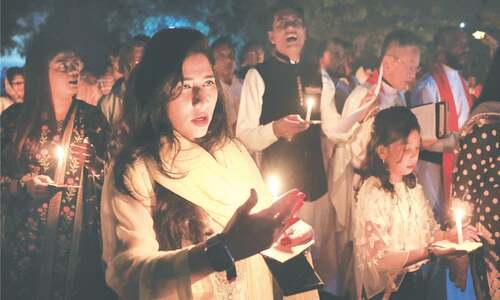UMERKOT: Alarmed by large-scale deaths of peafowl, which has a mythological status among birds because of its sublime beauty crowned with a plumage and gorgeous tail, Tharis have called for conservation of the bird’s habitats and establishment of veterinary clinics across the desert to effectively respond to an outbreak of disease among the birds.
Tharis, residents of Thar desert, blame a variety of causes for periodic outbreaks of the disease, which include a shortage of grain and water, long spells of droughts, deforestation, loss of habitat, climate change and desertification.
According to a low estimate, the bird numbers about 30,000 in Tharparkar and Umerkot districts. The villages of Malsaryo Mir Mohammad, Kasbo, Tejmal Je Veri, Bhodisar, Virawah, Pabuhar, Kerti, Chaho Suthar, Booli, Malnhor Weena, Batri, Batangari, Sajaee, Dabhri, Bapoohar, Hoti Jo Tarr, Kharoro, Seengli and Khorarou in Tharparkar, and Gaju Rano, Nimano Shah, Cheel Band, Sadhar and Sabho are the bird’s permanent habitats.
Ayaz Ali Samoon of Malsaryo village, 30 kilometres from Nagarparkar taluka, said that there were more than 500 peacocks in the village.
Some people were found involved in smuggling of the bird and the sale of its eggs and chicks but most villagers, following old traditions, considered it a sin to kill, sell or smuggle the birds and they had taken it upon themselves to protect it from poachers and smugglers, he said.
Nasrullah Samoon, a local poet living in the same village, said that in Thar, several people were bitten by snakes but there were rarely any deaths from snakebites because of peafowl, the sworn enemies of the limbless reptile.
A peacock which used to visit his home died last year, which so saddened his family that they did not eat anything the entire day, he said.
He recalled that once his father caught some villagers hunting peacocks, he slapped them and boycotted them socially for three years. “The bird’s beauty is its enemy. Any government official transferred to Thar wants a peacock as a gift,” he said.
Ashok Suthar, an intellectual, said that peacocks were not only beautiful they were also the best friends of desert people as they warned villagers about an imminent danger by squawking.
He claimed the bird could sense a disaster six hours before it actually occurred. “When it rains the bird celebrates it by opening its glorious tail and making moves to dance,” he said.
Long spells of drought, deforestation, climate change and rise in temperature had put great stress on the population of peacocks, which posed a serious threat to its survival, he said.
Writer Arbab Nek Mohammad said that many peacocks had died in bomb explosions during the 1965 and 1971 wars between India and Pakistan. “The bird is considered sacred because many believe it is asexual. When it contracts disease its throat develops a bulge, which bursts after a few days and spews worms, causing a painful death,” he said.
Bharumal Amerani, a social activist, said that peacocks were infected by the disease in 2010 also but it went unreported. In 2011 again, the disease caused the deaths of many birds and the media reported it but the wildlife department remained in a state of denial, he said.
In 2012, more than 472 peacocks died of the Newcastle disease, which forced the department to admit the deaths did occur because of the disease but it disputed the number of deaths after a professor of the Agriculture University of Tando Jam collected samples of dead and sick peafowl and declared after their examination that it was the Newcastle disease which had killed them.
Gul Yasmeen, an NGO activist, said that the Rann of Kachh was declared a wildlife sanctuary in 1980 but nothing had been done since then to protect the area.
Activity in salt mines, china clay factories, exploration of granite stones from the Karoonjhar hills, deforestation and establishment of villages were on the rise in the sanctuary in violation of Section 14 of the Sindh Wildlife Protection Act 1972 which prohibited deforestation, explorations, housing and factories in a sanctuary, she said.
She demanded that a survey be carried out to count the number of birds and their kinds, trees, plants, herbs and shrubs and called for declaration of the Karoonjhar belt from Pethapur and Nagarparkar to Sengharo as Karoonjhar national park where hunting, lumbering and acts to disturb biodiversity be prohibited.
Sanjay Sadhwani, a journalist, said that that it was the need of the hour that local communities were encouraged to protect the birds and suggested distributing literature among the masses about the bird. The subject of environment or ecology should be taught in schools at least in Tharparkar, he said.
He demanded the establishment of veterinary clinics across the Thar desert and posting of veterinary doctors in the wildlife department. The government should declare the bird a provincial bird of Sindh, he said.
Tharparkar Assistant Conservator Lajpat Sharma said the media had misreported the number of the bird deaths and villagers had exaggerated the facts. In fact, only four peacocks had died across the district, he said.
He admitted the bird had died of some disease but did not know which disease. He said the wildlife department had collected samples from the dead and sick birds and sent them to the PRI laboratory in Karachi to ascertain the cause of deaths.













































